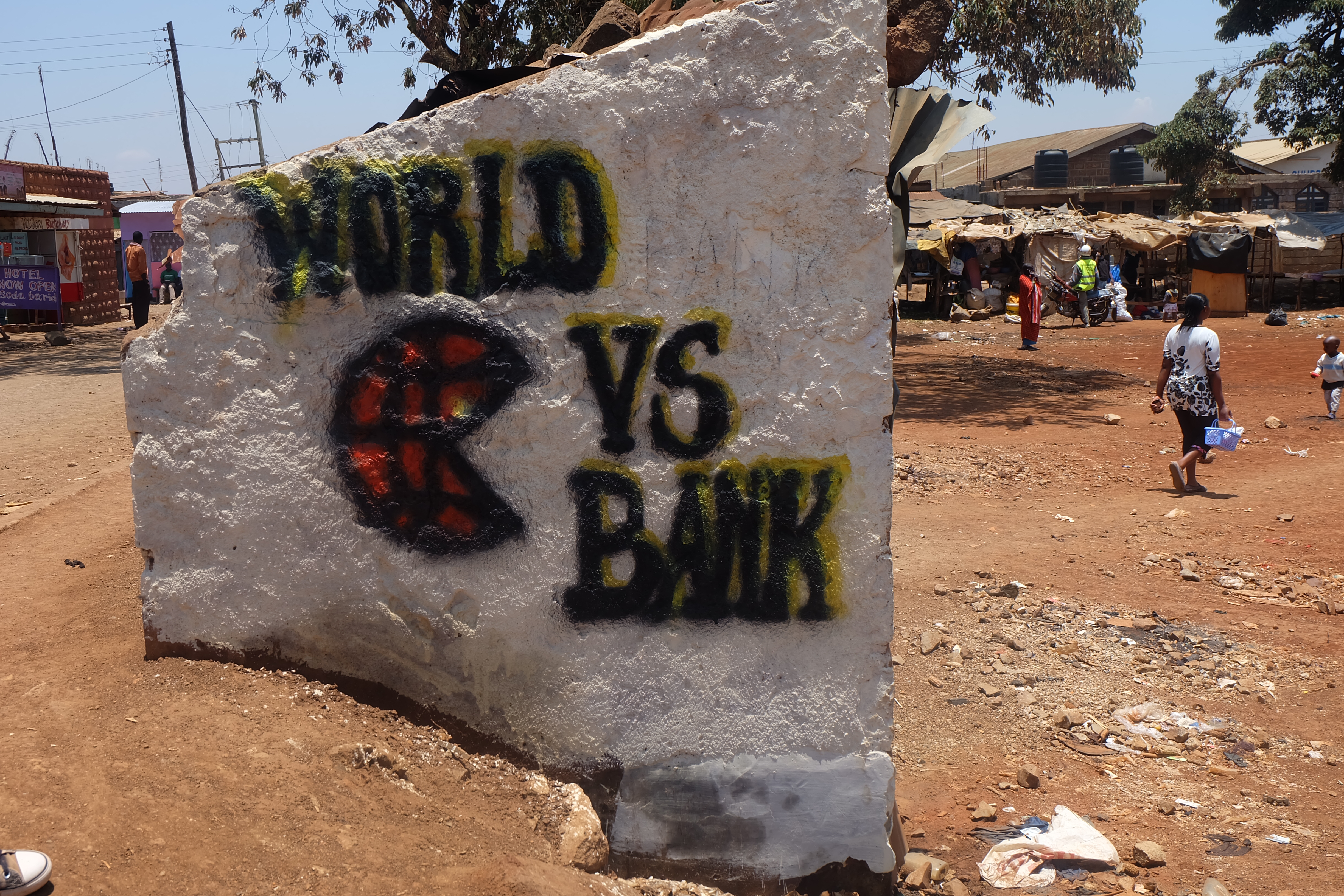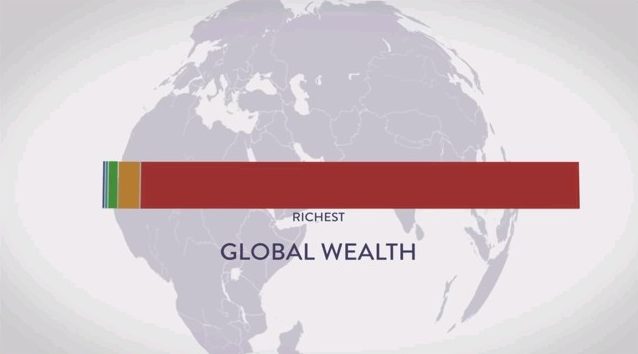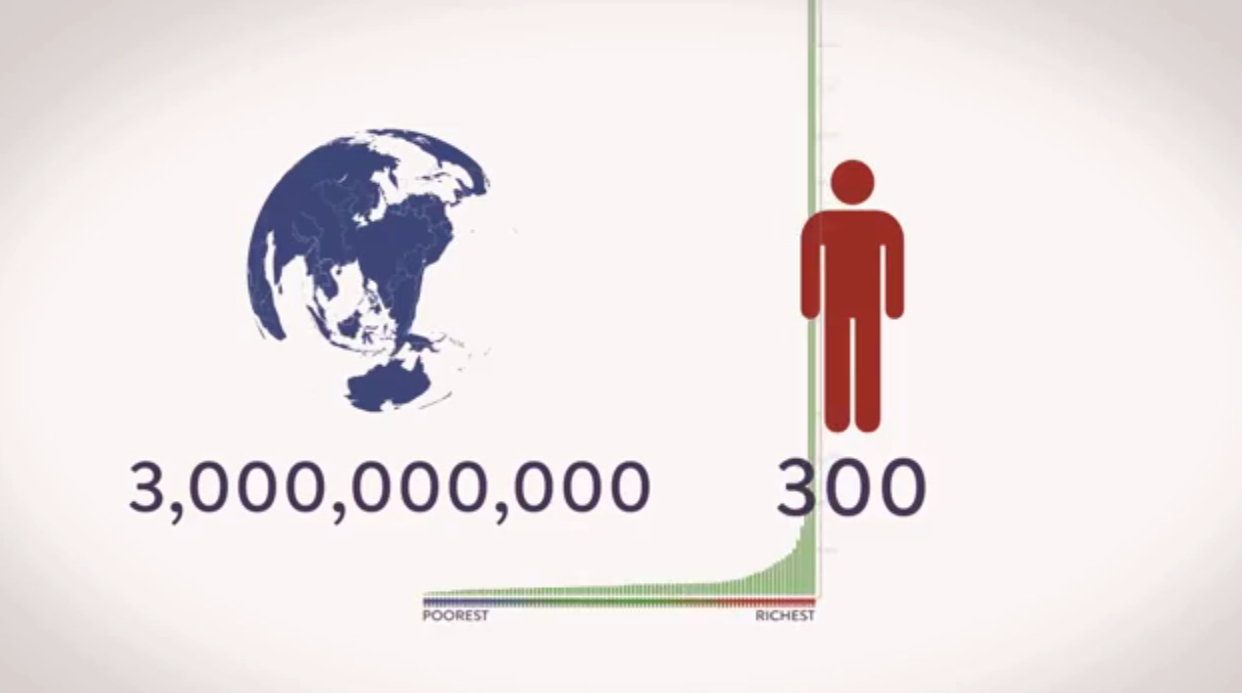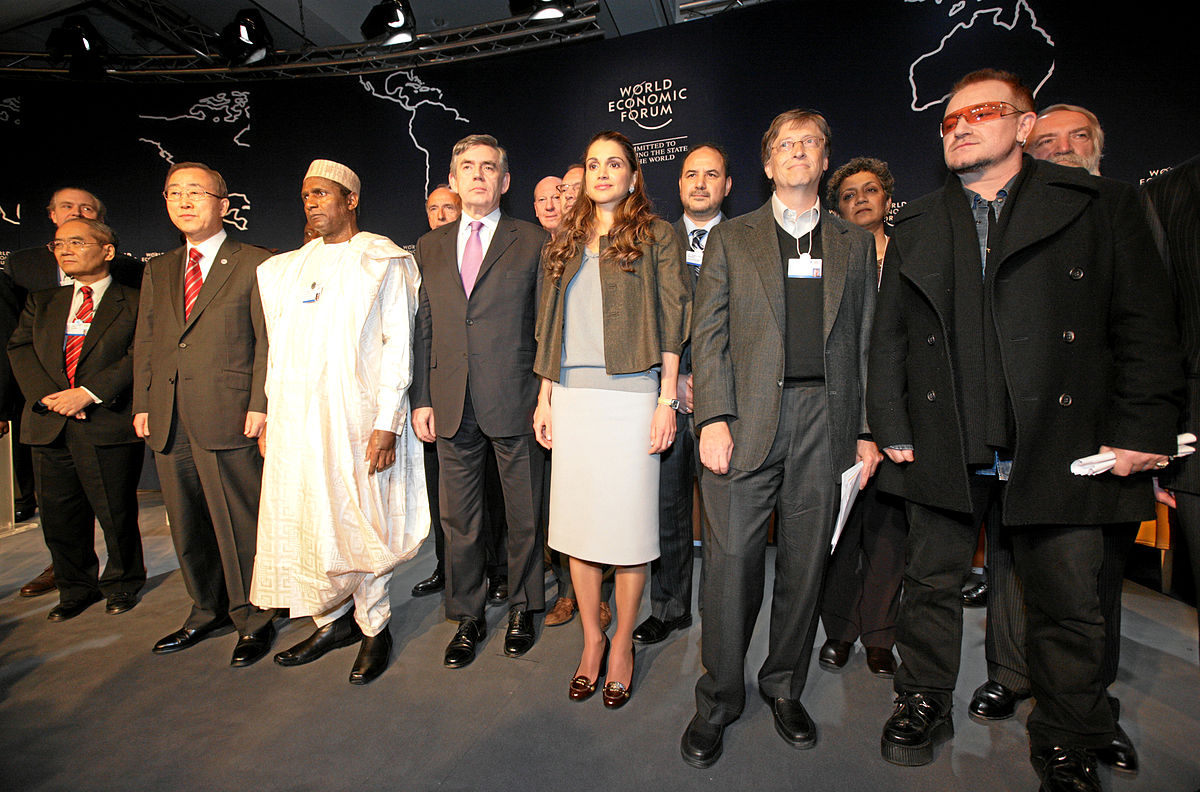
This article series has been co-published with Occupy.com
Written by: Alnoor Ladha and Martin Kirk
Reach the authors on Twitter at: @alnoorladha and @martinkirk_ny.
In the part one of this series, we explored some initial ‘dangerous thinking’ – how ideology is the invisible architecture we are told to never acknowledge and that climate change and inequality are logical outcomes of neoliberal capitalism. In part two, we explore the role of ordinary citizens like you and I, and what possibilities exist for truly emancipatory social change.
Dangerous Thought Three: We all live in the Matrix
There are some of us who believe that we are exempt from the neoliberal operating system. That this is an American or British, or even now, a Chinese phenomenon. But we would argue that through globalization and the global rule of corporations, we have now entered a late stage of capitalism in which we effectively all live in a One Party Planet – the Neoliberal Party.
Under this party, we are connected into a virtual Matrix by a web of beliefs, laws and structures.
We are programmed from birth to believe in the moral philosophy of competition, individualism, the virtue of material consumption, and social status determined by the wealth hierarchy.
We are told that wealth is a sign of virtue. And it’s a short step from there to believing that those with the most money are the most virtuous, that they deserve to have power over the rest of us.
We are convinced that paying off every debt to rich corporations and people is a moral obligation – that if we can’t, there is something wrong with us and we deserve to be punished.
In reality, we all know instinctively that we are defined by our connections to each other. Our individuality is a truth within the intricate web of society. Our individuation may help us operate in the world and navigate relationships, but it is not an impermeable barrier that we should celebrate as the be all and end all of life.
It is self-evident that the richest are no less connected than anyone else, which means that they, like everyone else, rely on the society of humans around them for their wealth – on government subsidies and services, on public education and tax-funded research, and on the hard labour of people poorer than themselves.

It is self-evident that the richest are no less connected than anyone else, which means that they, like everyone else, rely on the society of humans around them for their wealth.
Virtue is not the preserve of those who have hoarded the most money. If anything, the reverse is true. There is mounting scientific evidence to suggest that being so addicted to material wealth that you acquire it in the millions or billions is an unhealthy addiction that stunts moral, emotional and spiritual growth, and it can lead to highly sociopathic behaviour.
The line between sociopathic behaviour and a psychopathy is blurry at best. Just look at how large corporations, very often supported by governments, are forever coming up with even more ingenious ways to create debt, and aggressively promote ways of life and moral codes that require it so they can be confident that we will keep funneling money in their direction in the form of interest. This is a means of ensuring we remain submissive and docile as we focus all of our energy struggling to meet the obligations they have defined.
When there is potential to overturn the operating system – for example, the 2008 financial crisis – it in fact punishes the poor first and hardest as we are enmeshed in the global capital infrastructure from the food we buy to where our pensions are invested. The old trope holds true that the rich become even richer because power begets power, and money begets money – and the two are interchangeable. And this is what is most valued by the machine.
The Matrix is so powerful and adaptable that even when we do dissent, it often gets commodified and sold back to us. There were Occupy Wall Street posters being sold at Wal Mart last Christmas for over $40 USD a pop. Even techniques for spirituality are co-opted to make us better capitalists. There has been an exponential rise of Buddhism, yoga, meditation, Ayurvedic and other Eastern practices as crutches for mental burnout and spiritual ennui in capitalist countries.
The dark spider web of neoliberal belief is so powerful because it binds economic logic to a moral logic, so to question the economic logic (e.g. growth) is to question the morality of how we live and our very personhood. Since our jobs and our identities are all intertwined with that of the system, we are incapable of breaking free of the logic.
As the philosopher John Ralston Saul has said: “we assume that people of merit rise to the top of the system. But in fact, the system finds the people that are best constructed to further its own existence, and draws them to the top.” In other words, if the system values selfishness above all else, selfish people above all others will be rewarded with what the system has to offer.
We have all created our own stories in order to feel as comfortable as we can in the Matrix. People at the World Bank or the Gates Foundation believe they’re helping the poor, and in limited ways many of them are. People in advertising agencies think they’re contributing by being creative and increasing consumer choice, and at a micro-level this may be true. But by accepting and then validating the logic at the heart of the system they are in fact ensuring the murky waters of the status quo stay toxic. If we attempt to prune a tree in a rotten orchard, are we really having any impact on the health of the orchard?
Dangerous Thought Four: We live in false economy
So what is the root driver of all this madness? How deep do we have to dig?
The answer to that is, until we find what binds all the destructive forces. And within the current Matrix that we are all unmeshed, the root of growth is debt.
In a debt-based monetary system, the very creation of money creates debt. Therefore, growth has to exceed interest (which is the payback of debt) in order for capital to increase.
We thus get locked into perpetual debt-based growth, which creates inequality and destroys our planet. As David Attenborough has said, “If you believe in infinite growth on a finite planet, you are either a madman or an economist.”
We value the wrong thing – i.e. financial wealth – so we in turn measure the wrong thing – i.e. growth. We therefore live in a false economy.
Let’s give a concrete example. The global economy roughly grew at 3% last year (2014), which generated an additional $2.2 trillion in ‘new’ products and services. In other words, commodified natural resources and human labour to the tune of $2.2 trillion. This is equivalent of global GDP in 1970. It took us from the dawn of humanity to 1970 to achieve an annual GDP of $2.2 trillion dollars – we now require that amount just in the delta of a single year. Next year we may need 1974’s GDP, then 1990’s, etc. Soon we’ll need to 2015’s GDP in order for the global Ponzi scheme not to implode.
The mathematical way to describe this is that we are now in a period of exponential growth. When this happens in an organism we call it cancer: uncontrollable growth of cells to the point of self-annihilation. And because we are all locked into a Matrix that serves the neoliberal ideology, we are made complicit in our own self-annihilation. Growth is couched in jobs and securing investments, and indeed that’s true, so it becomes all of our business to create further growth.
This is not a dark room conspiracy – from the survival of the most basic cell all the way up to the infinite complexity of the Internet, this is how complex adaptive systems behave. They create and emerge from matrices of energy and matter that support their existence. The logic of capital is merely the logic of a particular complex, adaptive system. As Thomas Picketty recently has proven in such detail, left to its own devices, the system will always reward capital with more capital, pulled from the sources of production it has.
And while the destruction amasses, we are sold a false idea of the economy as a necessary savior to keep us complicit.
In 2011, 110 of the 175 largest global economic entities on earth were corporations, with the corporate sector representing a clear majority (over 60 percent) over countries. The revenues of Royal Dutch Shell, for instance, were on par with the GDP of Norway and dwarfed the GDP of Thailand, Denmark or Venezuela.
In other words, more economic power is in private hands than public. Most corporations started the globalization process by exploiting human labor where it was cheapest and the rules were the most slack. They then capitalized on the lack of global governance around tax and essentially opted out of the social contract with humanity – there’s now $32 trillion sitting in tax havens and 60% of world trade happens between MNCs own subsidiaries, largely through what’s known as transfer mis-pricing. And then the kicker, they subverted our democracy. Research from Harvard’s Saffra Center for Ethics shows that corporations achieve up to a $220 ROI for lobbying Congress. Why would you ‘invest’ your money in anything else.
We are told that as the rich get richer the rest of us will get richer too. But we know now that this is a lie. Average wages are lower today than they were in the 1960s, and household incomes are stagnating while the 1% are growing richer than ever before. Today, the richest 85 people in the world have more wealth than the poorest 3.5 billion.
We are told that we can solve global poverty if rich countries give more aid to poor countries. But see beyond the rhetoric and it’s horribly obvious that aid is flowing in the other direction. Rich countries are rich because they grab land and natural resources, and exploit the human labor of poor countries. We will only be able to eliminate poverty once we stop this plunder.
We believe that governments run the world, and that those governments are democratic. But the most powerful entities on earth are corporations, not governments, run for private profit not public good. And these corporations exercise undue influence over government policies. In a system where money buys votes, democracy is nothing but an illusion, and the hopes and desires of the majority are rarely considered.
We believe that our media is free and impartial. But in reality 90% of the media is controlled by only six corporations, which silence all criticism of their interests. And our Internet – which we rely on to communicate and share ideas – is poisoned by a global network of state surveillance.
We are told to that our current way of living provides some kind of ‘order’ forgetting that the entire system has been built upon the history of colonialism, imperialism and genocide. Not to mention the constant state of war, and plunder from poorer nations, that is required to prop up the Western way of life.
The only way to change things is to change what the system itself values, and to change the very rules that articulate and maintain those values.
Dangerous Thought Five: Another story is possible
These myths are falling apart around us, and the story that they uphold is beginning to collapse. The system is constructed by a set of laws and rules and beliefs constructed by human beings. As the comedian Russell Brand says, “Capitalism is not real; it is an idea. America is not real; it is an idea that someone had ages ago. Britain, Christianity, Islam, karate, Wednesdays are all just ideas that we choose to believe in and very nice ideas they are, too, when they serve a purpose. These concepts, though, cannot be served to the detriment of actual reality.”
We yearn for a different story, a better story, a story that is truer to the values we know are right – a story that celebrates our connections to others and to our broader world. We are eager to cast off debts, to stop being complicit in the exploitation of our brothers and sisters around the world, to cease the destructive pillage, to abandon the competition that turns friend into foe, and to recover our relationships. We are ready for healing.
We know that there are other stories out there.
Anthropologists tell us that for most of human history we lived in small egalitarian societies that rewarded co-operation and sharing and punished selfishness and accumulation. No one is saying we can go back to a hunter-gatherer lifestyle, but it’s an indicator of what’s possible for human nature – in fact, we have over 90,000 years of inspiration of what is possible.
Just ten years ago scientists discovered what they call mirror neurons, proving that we are hard-wired for empathy. And behavioral economists have shown that, when left to our own devices, tend to default to values of fairness and justice. These are the better, truer angels of our nature.
All we lack is the confidence to see beyond the constraints of the present story. And we start by asking the hard questions we have been told not to ask. People around the world are beginning to do just this. They are rising up in response to our civilization’s crisis – from Occupy Wall Street to the Arab Spring, from protests in Brazil to the Chilean Winter, from the Zapatistas in Mexico to the student uprising in Quebec, from the Idle No More Indigenous People’s movement to Transition Towns around the world – these are all expressions of a new world that is possible. They are sites of great hope for us all. The world is beginning to heal—and we can take it farther, faster.
There are new ideas bubbling up all around the world that point to a better way. Some of these solutions are not difficult, like moving away from GDP as a measure of progress, taxing carbon at its source, creating a global wealth tax, banning certain types of advertising, putting a moratorium on rigged trade rules (like the proposed Trans-Pacific Partnership), and even putting limits on how powerful corporations can become (e.g. the anti-trust laws that used to exist around the world, most notably in the United States up to the 1970s). Others are more radical, like removing corporate money from politics, abolishing military spending, revoking corporations’ right to do business if they don’t serve our collective interest, moving to a four hour work day, providing a basic citizen’s income to every human being, devolving power to local communities governed by direct democracy, an even getting rid of our debt-based currency system altogether.
Ideas abound. The decision is ours to reclaim our past and our future. Will we continue as soldiers of the status quo, regardless of destruction it will guarantee? Or will we stand with the world’s majority to create the better world we know is possible?











I like the vision and positive tone here. I’m glad the internet is allowing people to connect in greater numbers, those who find the corporate narrative abhorrent. I have a vision of people feeling that they need us more than we need them, and taking back power with that. A few well placed and timed strikes would put a serious dent in their exploitation machine, and show how thin it’s veil. I look forward to the pendulum swinging back in the direction of humane harmony and away from the cancerous, top dog takes all, new world order conditioning. I’m going to take action so my kids can have a better life.
“So what is the root driver of all this madness? How deep do we have to dig? The answer is, until we find what binds all the destructive forces.”
If we can accept that Capitalism is not reality any more than Socialism, Communism or Christianity, and that these concepts are nothing more than human constructs, the root driver becomes easier to narrow down. We need to acknowledge that it’s not of our creation.
If we look past these non-realities and ask “What is real?”, we come up with a mechanism that is responsible for our “success”, and the existence of civilization. It is a mechanism that has made it possible for our population to reach 7 billion, to inhabit every available niche on the planet and, unless understood in relationship to the way we are trained to see the world, it will be the reason we won’t survive much longer.
The mechanism is our natural survival response (NSR): we avoid pain and seek pleasure. It’s a universal response; it’s part of the makeup of all animal species. The only exceptions, in the human world, would be individuals that have been affected by cerebral trauma or those that have been exposed to endocrine disruption during the development of the central nervous system or those that have experienced self-destructive conditioning/learning.
The NSR is why we see economic struggles, environmental calamity and wealth disparity problems in every country; there are no exceptions. That’s why we see wealth disparity issues that have similar profiles in all countries. The differences in the way those struggles and problems are expressed is a function of geographic separation and cultural evolution.
Our NSR is responsible for making it extremely difficult to overcome our cognitive dissonance, vis-a-vis accepting lifestyles that are less environmentally destructive.
Our NSR binds all the destructive forces, and it blinds us from seeing that it is responsible for the economic and environmental dilemmas we face today.
Usually people feel worse before feeling better. The caterpillar has no idea that it is going to be a butterfly. The loss at first appears meaningless, to be endured, ignored, anesthetized, or avoided. What was once our security or even our delight is now a chain around our neck. Learning is the painful reorganization of what we thought we knew. We are being forced to discover inner resources that we are not aware of and do not know how to use. Our old “friends” and our family cannot understand what we are facing. We feel isolated, and we are. Of course we are angry! Roses grow best in shit! – p. 142 Love Always Wins: Hope for Healing the Epidemic of Violence
great conclusions and solution proposals at the end!
lets all go for it. lets change the rules for the sake of this beautiful planet and its creatures ^^
Inspiring article
Indeed the capitalist western world (based on the dream mind body dualism) is in deep crisis
Evolution is not about dreams, but about what is effective millions of years
have a look at:
http://paradigm-shift-21st-century.nl/capitalism-capitalist.htm